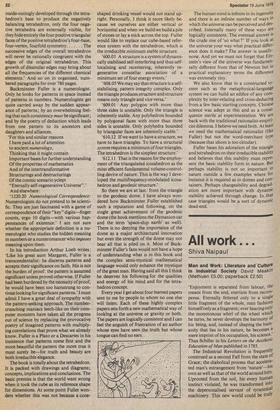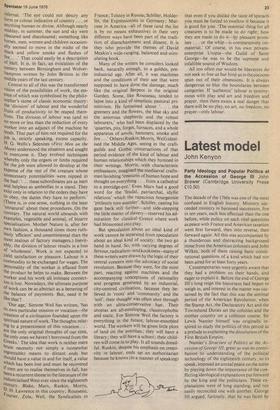All work . . .
Shiva Naipaul
Man and Work: Literature and Culture in Industrial Society David Meakin (Methuen £5.00; paperback £2.50)
'Enjoyment is separated from labour, the means from the end, exertion from recompense. Eternally fettered only to a single little fragment of the whole, man fashions himself only as a fragment ; ever hearing onlY the monotonous whirl of the wheel which he turns, he never develops the harmony of his being, and, instead of shaping the humanity that lies in his nature, he becomes a mere imprint of his occupation, his science: Thus Schiller in his Letters on the Aesthetic Education of Man published in 1785. The Industrial Revolution is frequentlY construed as a second Fall from the state of Grace; the diabolical process that accelerated man's estrangement from 'nature'—his own as well as that of the world around him. Uprooted from the soil, his every human instinct violated, he was transformed into the depersonalised servant of tyrannical machinery. This new world could be trulY
infernal. The eye could not descry any form or colour indicative of country .. . or anything human or divine. Although nearly Midday, in summer, the sun and sky were Obscured and discoloured; something like horses, men, women and children occasionally seemed to move in the midst of the black and yellow smoke and flashes of fire . .' That could easily be a description of Hell. It is, in fact, an evocation of the scenery between Birmingham and Wolverhampton written by John Britton in the middle years of the last century.
Central to all of this was the transformed vision of the possibilities of work, the essence of which was symbolised by the philosopher's stone of classic economic theory: the 'division' of labour and the wonderful fruits of productivity to be reaped therefrom. The division of labour was (and is) no more or less than the reduction of every Worker into an adjunct of the machine he tends. That part of him not required for the Job is, strictly speaking, excess capacity. H. G. Wells's Selenites (First Men on the Moon) understood the situation and sought to overcome it. They evolved techniques Whereby only the organs or limbs required for the job were allowed to develop at the expense of the rest of the creature whose unnecessary potentialities were nipped in the bud: '... these subordinates are as inert and helpless as umbrellas in a stand. They exist only in relation to the orders they have te obey, the duties they have to perform.' (There is, in one sense, nothing in the least unnatural' about these procedures. On the Contrary. The natural world abounds with examples, vegetable and animal, of bizarre sPecialisation. Mother Nature is, after her own fashion, a thousand times more ruthlessly 'efficient' and unsentimental than the rnost zealous of factory managers.) Inevitably, the division of labour results in a loss of 'wholeness'. Work is not expected to Yield satisfaction or pleasure. Labour is a commodity to be exchanged for wages. The Personality of the worker is effaced from the product he helps to make. Between the ,orker and his work all intimate connection is lost. Nowadays, the ultimate purpose of work can be as abstract as a bettering of the balance of payments. But, need it be like that ?
. 'Our age,' Simone Weil has written, 'has its own particular mission or vocation—the creation of a civilisation founded upon the Piritual nature of work. The thoughts relating to a presentiment of this vocation . . . are the only original thoughts of our time, the only ones we haven't borrowed from the Greeks.' The idea that work is neither mere brute necessity nor simply a (somewhat regrettable) means to distant ends but Should have a value in and for itself, a value Which has been lost and must be recovered if men are to realise themselves in full, has been a recurrent theme in the literature of the industrialised West ever since the eighteenth century. Blake, Marx, Ruskin, Morris, LI H. Lawrence in this country; Rousseau, r'ourier, Zola, Weil, the Syndicalists in
France; Tolstoy in Russia; Schiller, Holderlin, the Expressionists in Germany; Marcuse in America—all of these (and the list is by no means exhaustive) in their very different ways have been part of the tradition of disenchantment and dissent. It is they who provide the themes of David Meakin's wide-ranging, balanced and stimulating book.
Many of the writers he considers looked back, naturally enough, to a golden, preindustrial age. After all, it was machines and the conditions of their use that were supposed to have done the damage, much like the original Serpent in the original Garden. Some, like Rousseau, tended to lapse into a kind of simplistic pastoral pri mitivism. He fantasised about '. . the greenery and the flowers, the blue sky and the amorous shepherds and the robust labourers,' who had been displaced by the 'quarries, pits, forges, furnaces, and a whole apparatus of anvils, hammers, smoke and fire. . Others(Ruskin, Morris, Weil) idealised the Middle Ages, seeing in the craftguilds and Gothic constructions of that period evidence of the kind of labour and human relationships which they hymned in their writings. Morris, with characteristic enthusiasm, imagined the mediaeval craftsman lavishing 'treasures of human hope and thought on everything . . . from a cathedral to a porridge-pot.' Even Marx had a good word for the 'feudal, patriarchal, idyllic relations' which the rapacious bourgeoisie 'pitilessly tore asunder'. Schiller, casting his gaze back still further—and side-stepping the little matter of slavery—reserved his admiration for classical Greece where work had blossomed into play.
But speculation about an ideal kind of work cannot be separated from speculation about an ideal kind of society: the two go hand in hand. So, with varying degrees of fervour, radicalism—and kookiness—many of these writers were drawn by the logic of their central concern into the advocacy of social revolution. Because they were, for the most part, reacting against machines and the accompanying conceptions of rationality and progress generated by an industrial, city-centred civilisation, because they believed in 'roots' and 'community' and the 'soil', their thought was often shot through with an ultra-conservative hue. Their utopias are all-enveloping, claustrophobic and static. For Simone Weil the factory is everything in the future, labour-ennobled world. The workers will be given little plots of land on the premises; they will have a library; they will have a school ; their children will come in to play. It all sounds dreadful. Ruskin, despite his emphasis on creativity in labour, ends up an authoritarian because he knows (in a manner of speaking) that even if you dislike the taste of 'spinach • you must be forced to swallow it because it is good for you. 'The essential thing for all creatures is to be made to do right; how they are made to do it—by pleasant promises . . . or the whip—is comparatively immaterial.' Of course, in his own privateenterprise Utopia—the Guild of Saint George—he was to be the supreme and infallible source of Wisdom.
All too often our would-be liberators do not seek to free us but bind us in the cocoons spun out of their obsessions. It is always dangerous to blur the boundaries between categories. If 'authentic' labour is synonymous with play and art and freedom and prayer, then there exists a real danger that there will be no play, no art, no freedom, no prayer—only labour.



































 Previous page
Previous page